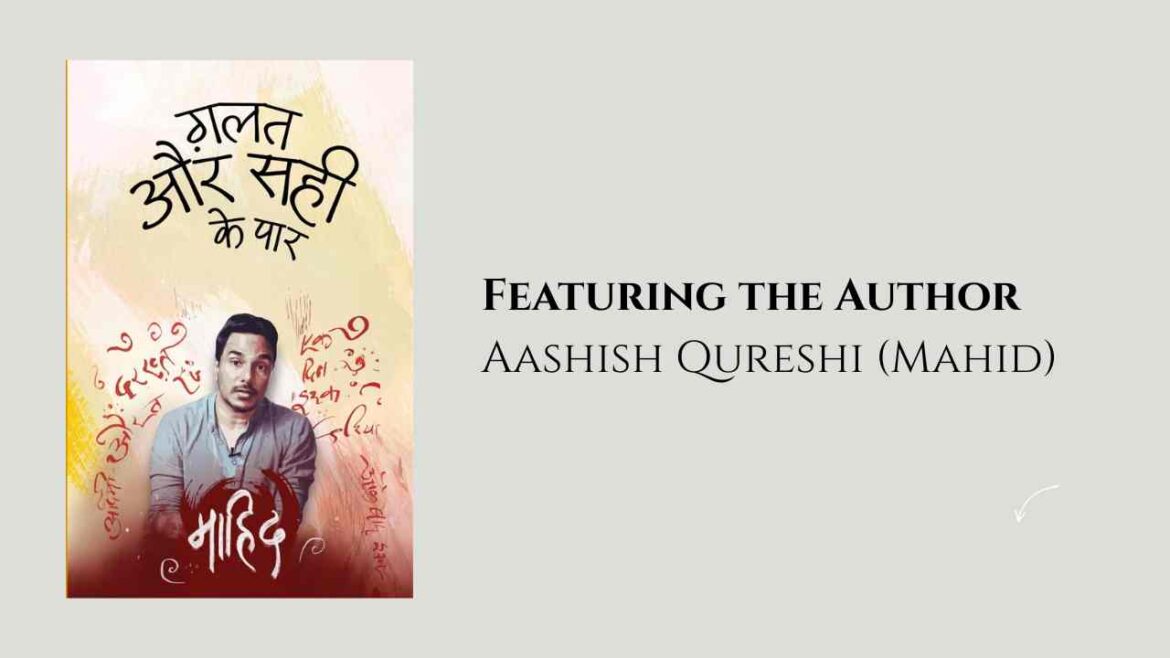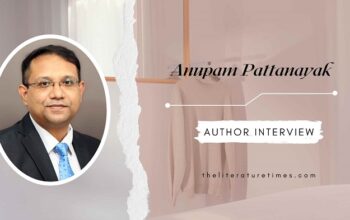Aashish Qureshi (Mahid) is a multidisciplinary storyteller with a diverse background in advertising, radio broadcasting, brand communication, podcasts, and screenwriting. He has created award-winning audio series, acclaimed short films, and amazing storytelling projects such as 1000 Crore Ki Laash, Ek Tha Legend – The Story of Sidhu Moosewala, and Bhatt Naturally. With his debut poetry collection Galat Aur Sahi Ke Paar, he steps into the world of verse, weaving together love, satire, social commentary, and introspection with the same fearless creativity that defines all his work.
The Literature Times: Congratulations on your debut poetry collection Galat Aur Sahi Ke Paar! What inspired you to write this book?
Aashish Qureshi: When life becomes filled with too much wrong and too much right, it naturally turns into poetry. That’s how it happened with me, too. Experiences kept piling up—so many of them—that they demanded to be written down. And when I gathered them together, they took the shape of this book. But I feel that writing a book is not as difficult as deciding which part of your life you want to present before people, exactly as it happened. But I must confess, writing the book wasn’t the hardest part. The real challenge was deciding which parts of my life I was ready to share exactly as they happened, and which parts I should keep to myself. I cannot say how other writers go about this, but for me, it was hard to choose which fragments of my life to reveal and which to keep hidden. Perhaps it was this very struggle that pushed me further, that inspired me to dig deeper. By struggling through this process, I came to understand myself better. Maybe now, I will be able to write with greater honesty.
The Literature Times: The title is very intriguing—Galat Aur Sahi Ke Paar. How did you arrive at it, and what does it personally mean to you?
Aashish Qureshi: The right and wrong in each of our lives are different. It is possible that what feels right to me may appear wrong to you, or what you believe to be right may seem wrong to me. That is why, at times, we need to look beyond the right and the wrong. Many people go through life without ever developing this perspective. Their notions of right and wrong sit on their heads like two horns. I was actually avoiding saying “bull.”
So, when I began writing poems, I found many things standing in the dock—things tied to relationships, to society’s injustices, to some anger, to some confusion. To confine them only within the boundaries of right and wrong would have been unfair. That is why I carried my poems beyond right and wrong. And this is why you see me calling poetry both love and a gun in my book.
The Literature Times: Your book refuses to draw a line between right and wrong and instead explores the grey areas of life. Was this a conscious creative choice?
Aashish Qureshi: You see, I believe writing poems about right and wrong is very easy. A rising sun and a setting sun—you will find them everywhere in poems, paintings, films. I feel I should rather write about the waiting for the rising sun, about those eyes that have stayed awake through the night in anticipation of that dawn. Or perhaps I should write about that afternoon which lingers on as the fuel for the beauty of a sinking sun.
And when it comes to making a conscious creative choice, yes, I do try to write something new, something untouched. But let me also say this—just because it is my choice doesn’t mean much; often, it is the poems that choose you, and then you can do nothing about it. It is exactly like digging into a mine without knowing what you might unearth.
The Literature Times: Having worked extensively in advertising, broadcasting, and storytelling across mediums, how different was the experience of writing poetry?
Aashish Qureshi: I feel that no matter what the medium is, when a writer writes, they want their words to reach everyone. The emotional intensity with which something is written or spoken should leave the same impact on the reader or listener.
One thing that sets poetry apart is this: poetry is born when you are emotionally fragile, when you are most vulnerable. It is a very different emotional state. You cannot quite understand what is happening within you, nor can you tell it to anyone else. It feels as if you are suspended in mid-air, and until you write, you will remain hanging there.
Sometimes it becomes hard to decide whether you are writing poetry or the poetry is writing you. You must have seen magicians pull pigeons out of thin air; poetry, too, emerges like that from the air. The only difference is that here it is real magic, not an illusion.
The Literature Times: The collection moves between humor, heartbreak, solitude, and rage. How did you manage such diversity of tone while keeping the collection cohesive?
Aashish Qureshi: Humour, heartbreak, solitude, and rage—you may call all of this experience. I have written my first book at an age when my pockets are already heavy with experiences and stories of every kind. I have lived in the quiet of villages, the hum of small towns, the rush of cities, and now I live in a metropolis like Mumbai. My feet have walked the narrow trails of villages as well as the crowded pavements of Mumbai.
I have tasted hunger and sat with loneliness. I have loved deeply and suffered heartbreak. I have endured the injustices of society and the iron hand of governments. And with all of that carved within, I believe these are enough medals on the chest for anyone to write poetry.
The Literature Times: Poetry is deeply personal. Was there any moment while writing this book where you felt particularly vulnerable as a writer?
Aashish Qureshi: Every time I sit down to write a poem, the same thing happens to me. I understood long ago that poetry cannot be written by someone who is dishonest with themselves. To write poetry, you have to face yourself with complete honesty.
I don’t mean to say that everyone who doesn’t write poetry is dishonest. What I mean is: if you keep deceiving yourself, lying to yourself, or trying to trick yourself, you might manage to fill your pockets, but you will never be able to fill a blank page.
To write poetry, to write stories, to be part of any kind of creative writing, the first requirement is to be honest. That is what I believe.
The Literature Times: Who are some poets or writers—Indian or international—who have influenced your style or inspired you on this journey?
Aashish Qureshi: I deeply admire Rumi’s words and poetry, which is why I chose the title of my book—Galat Aur Sahi Ke Paar—from one of his lines. The way he speaks about God, the world, and the mysteries of life feels endless; no matter how much you read him, there’s always more to understand.
I also carry a great love for Mirza Ghalib’s work. When Gulzar Sahab wrote his book on Ghalib, it gave me the chance to see his writings more closely, more intimately. And yet, even after reading him, one always feels that one hasn’t read him enough.
I have also studied Shakespeare very closely. In his plays and stories, the way human weaknesses are used makes you feel as though those flaws are your own, and you slowly become a part of the story yourself.
Beyond them, there are countless other names that cannot even be listed on one’s fingers. From each one of those writers, I have learned something or the other. Whether I want it or not, their influence will always remain in my writing. And for that, I am deeply grateful to them all.
The Literature Times: What do you hope readers will carry with them after reading Galat Aur Sahi Ke Paar?
Aashish Qureshi: I feel this book has been written with great courage. At many points, it appears to challenge relationships, society, and the system. And I am certain that the readers of this book will value that courage.
I remember one of my school teachers once said—“Poems are like tiffin boxes; they are shared only with a few.” I hope that people will share this book and its poems with one another. In this tiffin, I have kept something for everyone. Open it once, and see for yourself.
The Literature Times: Finally, can you give us a glimpse into what’s next? Do you plan to continue exploring poetry, or will you return to storytelling in other formats?
Aashish Qureshi: My writing for other storytelling formats will certainly continue. But that does not mean the journey of books will stop. At present, I am working on two different books simultaneously, both collections of stories. They should be available either by the end of this year or the beginning of the next.
One of them is filled with magic, mystery, and emotions, while the other delves into the battles that take place within a man. You will get to read them very soon.
Order Now: https://www.amazon.in/dp/933431267X



